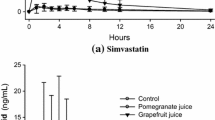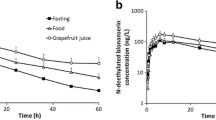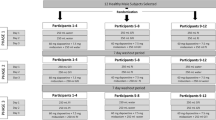Abstract
Objective: As quinine is mainly metabolised by human liver CYP3A4 and grapefruit juice inhibits CYP3A4, the effect of grapefruit juice on the pharmacokinetics of quinine following a single oral dose of 600 mg quinine sulphate was investigated.
Methods: The study was carried out in ten healthy volunteers using a randomised cross-over design. Subjects were studied on three occasions, with a washout period of 2 weeks. During each period, subjects received a pretreatment of 200 ml orange juice (control), full-strength grapefruit juice or half-strength grapefruit juice twice daily for 5 days. On day 6, the subjects were given a single oral dose of 600 mg quinine sulphate with 200 ml of one of the juices. Plasma and urine samples for measurement of quinine and its major metabolite, 3-hydroxyquinine, were collected over a 48-h period and analysed by means of a high-performance liquid chromatography method.
Results: The intake of grapefruit juice did not significantly alter the oral pharmacokinetics of quinine. There were no significant differences among the three treatment periods with regard to pharmacokinetic parameters of quinine, including the peak plasma drug concentration (Cmax), the time to reach Cmax (tmax), the terminal elimination half-life (t1/2), the area under the concentration–time curve and the apparent oral clearance. The pharmacokinetics of the 3-hydroxyquinine metabolite were slightly changed when volunteers received grapefruit juice. The mean Cmax of the metabolite (0.25 ± 0.09 mg l−1, mean ± SD) while subjects received full-strength grapefruit juice was significantly less than during the control period (0.31 ± 0.06 mg l−1, P < 0.05) and during the intake of half-strength grapefruit juice (0.31 ± 0.07 mg l−1, P < 0.05).
Conclusion: These results suggest that there is no significant interaction between the parent compound quinine and grapefruit juice, so it is not necessary to advise patients against ingesting grapefruit juice at the same time that they take quinine. Since quinine is a low clearance drug with a relatively high oral bioavailability, and is primarily metabolised by human liver CYP3A4, the lack of effect of grapefruit juice on quinine pharmacokinetics supports the view that the site of CYP inhibition by grapefruit juice is mainly in the gut.
Similar content being viewed by others
Author information
Authors and Affiliations
Additional information
Received: 2 November 1998 / Accepted in revised form: 18 February 1999
Rights and permissions
About this article
Cite this article
Ho, P., Chalcroft, S., Coville, P. et al. Grapefruit juice has no effect on quinine pharmacokinetics. E J Clin Pharmacol 55, 393–398 (1999). https://doi.org/10.1007/s002280050646
Issue Date:
DOI: https://doi.org/10.1007/s002280050646




